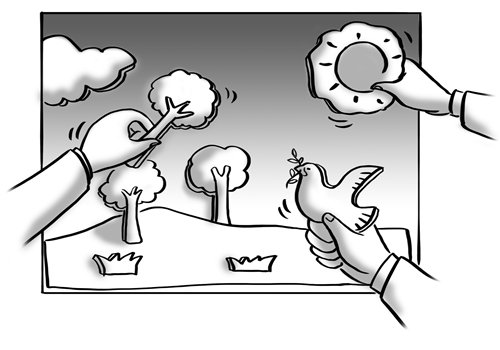
Illustration: Liu Rui/GT
The Korean Peninsula seems to be at the brink of war. Peaceful development in Northeast Asia is under serious threat. This issue is only a microcosm of a wider security issue in Northeast Asia. It cannot be overlooked that there are still challenges in the transformation of the international system in Northeast Asia. They include the challenges brought on by the shift in focus of US military strategy, its forward military deployments and Japan's "normal state" military ambitions. The security dilemma of these major powers accompanied by disputes over territorial sovereignty and maritime rights threaten the peace and stability of Northeast Asia.
China is a big power in Northeast Asia. The region is an important geopolitical basis for China's peaceful development. Facing the complicated Northeast Asian situation, China should have a clear strategy for its peaceful development.
Three factors affect Northeast Asia's peaceful development: the transformation of the international system in Northeast Asia, the problems left by history and each country's national strategy. We should adjust to the factors and address each problem at its root. Three measures can be taken.
The first is about risk control. Sanctions should be imposed on any violations of international laws or UN Security Council resolutions to curb illegal risk-taking. Practical measures should be taken to avoid escalation of tensions. The "suspension for suspension" initiative proposed by China offers a flexible measure. Northeast Asian countries can exchange intelligence information, coordinate their stances and policies and take joint actions and measures.
The second is about establishing a security mechanism. The way out of the North Korean nuclear crisis is peaceful settlement rather than sanctions or military presence. The resumption of Six-Party Talks would be significant in solving the nuclear crisis and upholding the peace and stability of Northeast Asia. It is necessary to explore the establishment of a multi-level, complex and diverse mechanism of dialogue and cooperation in Northeast Asia. The mechanism should include the establishment of a military exchange and trust-building mechanism. Dialogue and cooperation mechanism can deal with non-traditional security issues. These mechanisms will provide institutional guarantees of peace and stability in the region.
The third is about establishing a new order. Northeast Asia experienced a long bipolar Cold War where military blocs led by the US and the Soviet Union confronted each other. Military security was thus the priority. An arms race was the means of international competition. The new order in Northeast Asia would instead adhere to the purposes and principles enshrined in the UN Charter and the norms of international law. We need to transcend social and ideological differences and respect each country's choice of social system and development path.
We should abandon major power hegemony and power politics, never resort to threats or violence and insist on peaceful settlement of disputes. The Cold War zero-sum game mentality should be abandoned. We should pursue reciprocity and mutual benefit, harmonious coexistence and win-win cooperation.
As a big country in Northeast Asia, China owns vital political, economic, security and cultural interests in this region. Maintaining geopolitical peace and stability is the basis of peaceful Chinese development. China is not only a stakeholder but also an advocate, protector and builder of regional peace.
When it comes to state-to-state relations in Northeast Asia, Sino-US relations take top priority. Emphasis is also placed on Sino-Russian relations, with the Sino-North Korean relationship regarded as key, and China-Japan-South Korea relations will lay the basis. China will adhere to a neighborhood diplomacy approach of amity and peaceful development and properly handle differences and disputes with Northeast Asian countries.
In short, China will develop a new type of great power relations based on mutual benefit, harmonious coexistence and win-win cooperation.
The author is a professor of international politics at the College of Administration, Jilin University. The article was selected from his thesis at the Tumen River Forum held in Yanbian last week. opinion@globaltimes.com.cn
